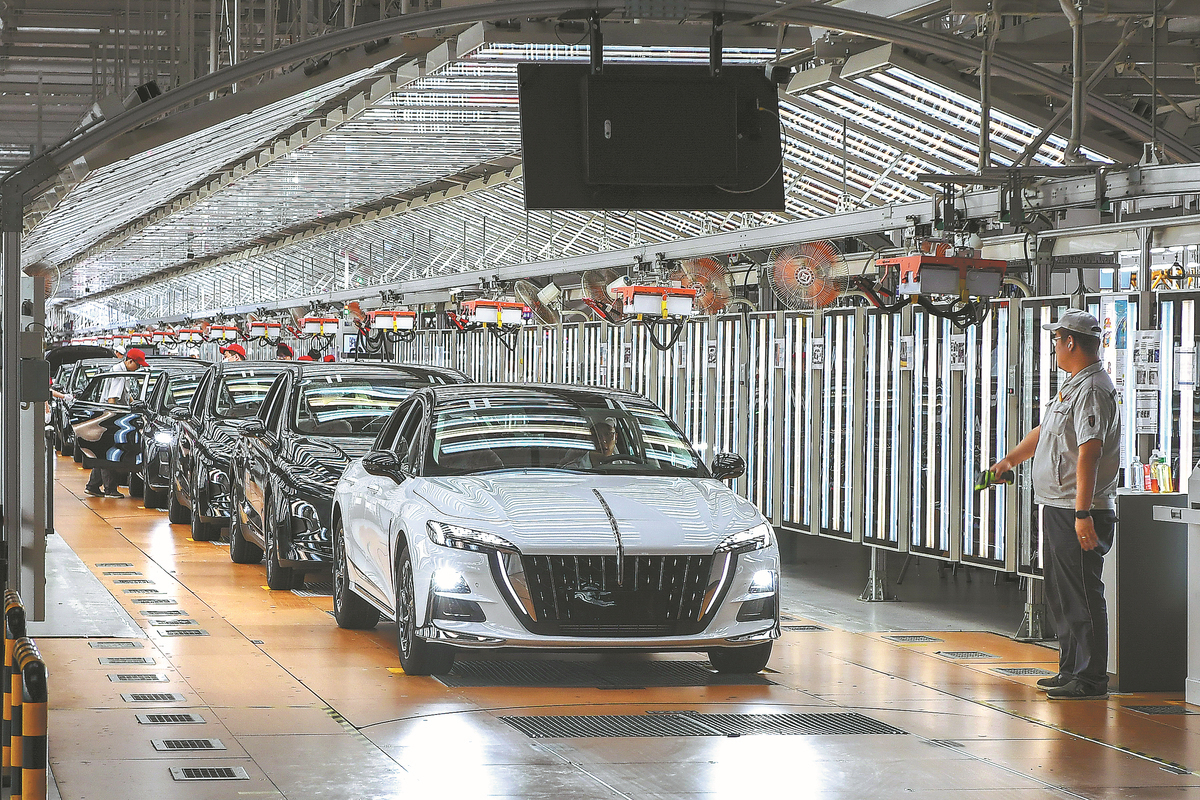
Technicians carry out quality tests on vehicles at Hongqi’s manufacturing base in Changchun, Northeast China’s Jilin province. [Photo/Xinhua]
Changchun, Jilin province launched a “vehicle-road-cloud integration” construction project on Tuesday, planning to invest 12.7 billion yuan ($1.75 billion) to build typical demonstration scenarios in its traffic hubs, urban roads, expressways and highways over the next three years.
The move comes after the city was designated by the Ministry of Industry and Information Technology and four other government departments as one of the first 20 pilot cities for the application of vehicle-road-cloud integration earlier this month.
The pilot program, which will run until 2026, aims to advance the commercialization of smart vehicles by integrating intelligent driving technology with roadside perception and cloud-based control.
Huang Xianyu, a member of the Standing Committee of the CPC Changchun Municipal Committee and vice-mayor of Changchun, said at the launch event of the construction project that the city will build 1,400 new 5G base stations during the three-year pilot period, with the coverage rate of roadside units in the urban area reaching 96 percent.
The city will ensure more than 1.5 million locally produced vehicles with L2-level or higher-level intelligent driving capability equipped with onboard terminals for vehicle-road-cloud integration application, he said.
Huang said more than 70 percent of the public sector vehicles used in the city will be pre-installed with the onboard terminals. It will also retrofit 14,500 public sector vehicles and 20,000 private vehicles to install the onboard terminals for them.
During the launch conference, the Changchun government signed a framework agreement with China FAW Group Corp, China Mobile and China Intelligent and Connected Vehicles (Beijing) Research Institute Co Ltd to cooperate in the application of intelligent connected vehicles and vehicle-road-cloud integration.
“As emerging technologies such as big data, AI and new-generation information and communication rapidly converge with the automotive industry, intelligent connected vehicles have become an important direction for the global automobile industry, with vehicle-road-cloud integration playing a pivotal role,” said Zhang Jinhua, president of the China Society of Automotive Engineers.
Zhang suggested Changchun leverage the vehicle-road-cloud pilot program to build an ecosystem that integrates new infrastructure, intelligent transportation, smart energy and new consumption.
Zhang also recommended the city to explore the application scenarios and implementation paths for vehicle-road-cloud integration in cold regions, and fill the gap in road testing and demonstration applications of intelligent connected new energy vehicles under ice and snow conditions.
Yan Gang, deputy director of the National Innovation Center of Intelligent and Connected Vehicles, said the implementation of vehicle-road-cloud integration will significantly improve transportation efficiency and safety, and boost the construction of smart cities.
However, the vehicle-road-cloud integration project is a complex system that requires joint efforts of multiple parties, including the government, automakers, communication companies and the transportation sector, he said.
Yan said the innovation center will empower the construction of the Changchun project by providing system software and cloud-based control platforms for intelligent connected vehicles, and ensure the data, network, and communication security during the application process.
Changchun is home to six major automobile manufacturers, with a complete auto industrial chain and an annual vehicle production capacity of nearly 2 million units.
According to the Changchun government, in the first half, the city’s auto production and sales reached 745,000 units and 743,000 units, a year-on-year increase of 9.7 percent and 8.3 percent, respectively.
Han Junhong contributed to this story.
